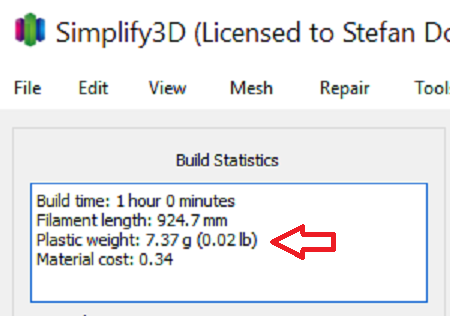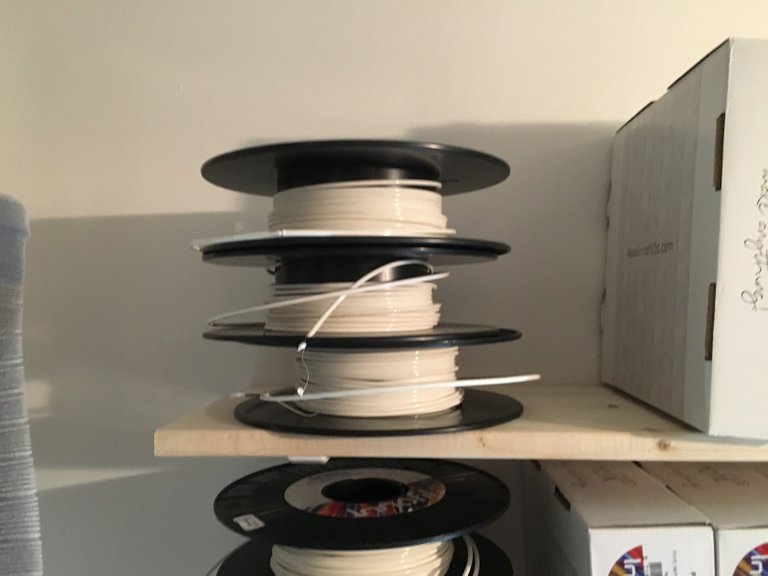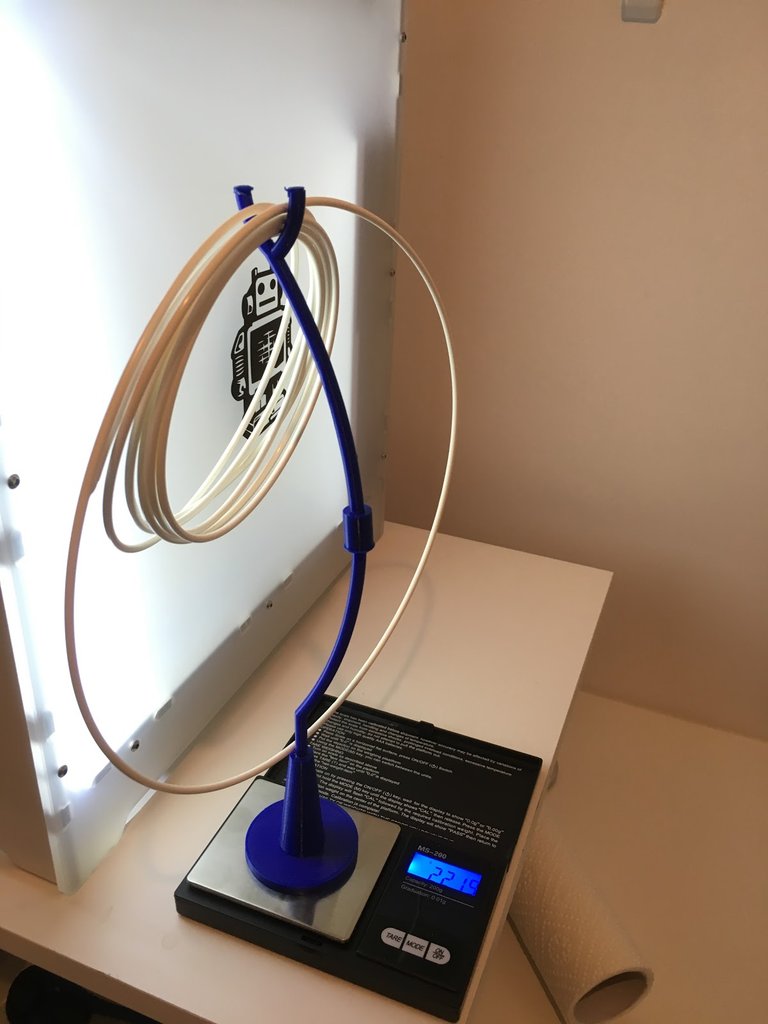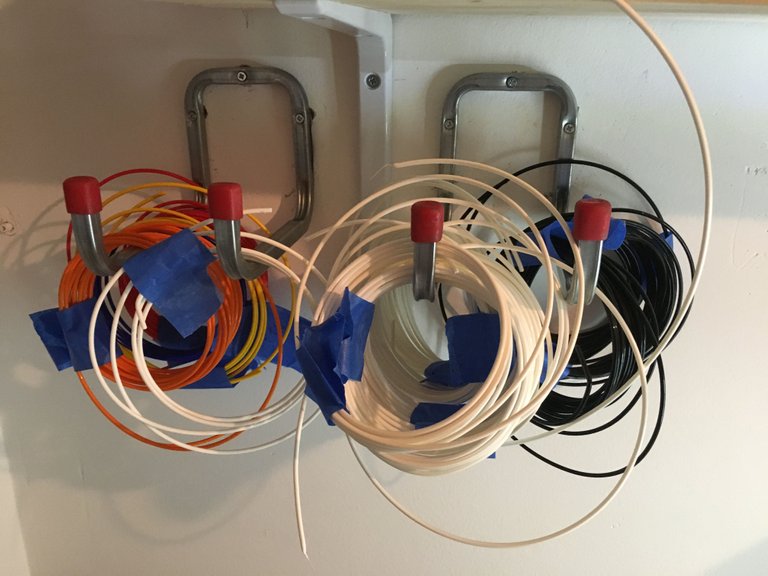When you print a lot with your 3d printer, you end up with many spools of filament that have only a few grams of it leftover. If you don't know exactly how long the filament on the spool is, you don't see what you can still print. But you also don't want to unwind the filament of the spool to measure its length.
In this post, I want to show you how to get more things printed with all those little leftovers.
First, we need to determine how much filament we do have and second, how much is required for a specific print.
1. How much filament do you have?
You need to weight the filament on a good scale. The scale should be very precise in the range of 0-200g. Most of those scales have a flat surface and it is difficult to put the filament coil on it.
That’s why I designed this specific filament holder. It can be used on the scale and holds small filament coils in the middle of the scale. Remember to tare your scale with the holder so you don’t include the holder in the measurement.
You can download this holder at https://www.thingiverse.com/thing:2771321 and print it yourself.
I typically end up with a bunch of filament coils that are weighted when cleaning up all the almost empty spools.
2. How much do you need for a specific model?
There are many small and useful prints that you can use for the leftovers. My favorites are either somehow helpful or great small presents:
- Bag Clips - https://www.thingiverse.com/thing:330151
- Filament Clips - https://www.thingiverse.com/thing:282242
- Keychain as Smartphone Stand - https://www.thingiverse.com/thing:1587568
- Bike Business Card - https://www.thingiverse.com/thing:714484
- Micro Catapult - https://www.thingiverse.com/thing:1763518
You then upload your model as usual in your slicer of choice.
Most slicers can show how many grams of a filament is required for a specific model. Ensure that you have the correct density settings in your slicer for the material you want to use. I do use 1,25 grams/cm^3 for PLA, and this works fine.

Other density values for common Materials
| Material | Density |
|---|---|
| PLA | 1,21–1,43 g/cm3 |
| ABS | 1,04 - 1,12 g/cm−3 |
| PETG | 1.23 g/cm3 |
| HIPS | 1.03 - 1.04g/cm3 |
| Nylon | 1.06 - 1.14g/cm3 |
A detailed overview of more materials and also other properties you can find at Simplify3d. https://www.simplify3d.com/support/materials-guide/properties-table/
What you also need to know is, how much filament is between your feeder and your print head. If you have a 3d printer with a feeder that is connected to a Bowden tube with the printhead, you need additional filament of the length of your Bowden tube to calculate it.
You should cut a piece of a filament to this length and weight it.
For my Ultimaker 2+, it is about 8g for PLA filament that is required.
If your feeder is direct at the print head, this should be a lot less.
Knowing how much grams you need for your model (model weight + feeder to head weight) and knowing how much your filament weighs, you can now start printing all the small gadgets!
Have fun and happy printing!



I'm going to print the Touring Bike Business Card and the Micro Catapult just to see are those as cool as the picture shows. Good job!
For the catapult, you should use ABS. This won't work with PLA as this is not flexible enough.
Thanks for the tip! I would probably have printed it first from PLA.
I have always relied on estimating length of the remaining filament, I might buy a scale so I can use your method :)
i failed to often with that estimation :)
If you had any totally empty spools of the same brand filament you would be able to find the weight of the spool. Then on any other same brand filament, you would not need to take the remaining filament off the spool. Just weigh the whole thing then subtract by the weight of just the spool.
This could be slightly inaccurate as spools weight could change, but I would think it would be almost none if any. I have a bunch of empty spools lying around that I may weigh to see if they are different weight.
Yes, you are correct. I didn't do this because the small coils need less space and you want to have a scale that is very precise between 20-100grams. Spools often wight more than 250+ grams. With this you end up in a higher range and finding there precise scales is more expensive.
Did not even think about the added space the spools would need. Good point! However, the weighing with the whole spool would still be useful even if it was about half a spool left since I often do fairly large prints.
yea good point... currently my 3d printer of choice would be a Prusa MK3 they just stop when the spool is empty and you can insert the next one! In this case you only have to worry if you have one more on the shelf or not :)
I would love the MK3, currently have an MK2 though. Thinking about the MK2.5 upgrade, but really want to upgrade to the MK3.
Congratulations! This post has been upvoted by SteemMakers. We are a community based project that aims to support makers and DIYers on the blockchain in every way possible. Find out more about us on our website: www.steemmakers.com.
If you like our work, please consider upvoting this comment to support the growth of our community. Thank you.
Definitely, love your Project! We need to grow the maker community here on steem.
Your post had been curated by the @buildawhale & @ipromote team and mentioned here:
https://steemit.com/curation/@buildawhale/buildawhale-curation-digest-01-31-18
Keep up the good work and original content, everyone appreciates it!
Thank you